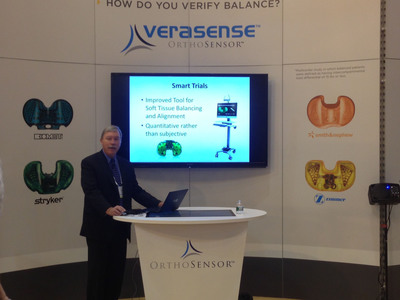DANIA BEACH, Fla., March 12, 2014 /PRNewswire/ --OrthoSensor, Inc., the leader in Intelligent Orthopaedics, today announced that one-year results of the VERASENSE Multicenter Evaluation were first presented during the American Academy of Orthopaedic Surgeons (AAOS) 2014 Annual Meeting in New Orleans, LA.

Dr. Kenneth Gustke, Florida Orthopaedic Institute Adult Reconstruction Surgeon and a lead investigator for the multicenter evaluation, presented the results and reported that patients whose knees were balanced with the VERASENSE Knee System, defined as having an intercompartmental loading difference ofless than or equal to15 lbs, showed statistically significant improvements in Knee Society Score (KSS) for pain and function, Western Ontario Western Ontario and McMaster Universities Osteoarthritis Index (WOMAC) scores, increased activity levels, and higher patient-reported satisfaction.
Details of the one-year clinical outcomes presentation included:
- At one year, the average total KSS score of balanced patients exceeded that of unbalanced patients by 23.3 points (P<0.001); 179+/-17.2 and 156+/-23.4 for the balanced and unbalanced groups, respectively. The balanced group average score for KSS pain and function were 96.4 and 82.4 respectively; the unbalanced group scored 87.8 and 68.3 points for pain and function. The disparity between the balanced and unbalanced patients' pain and function scores were highly statistically significant (P<0.001, P=0.022).
- The balanced group averaged 8 points greater improvement in WOMAC scores than the unbalanced group (10+/-11.8 and 18+/-17 for balanced and unbalanced patients, respectively). It is important to note that the WOMAC is scored with an inverse scale; lower scores indicate more improvement.
- The balanced group's average activity level score was 48.6, which corresponds with the light to moderate labor categories (tennis, light jogging, heavy yard work). The unbalanced patient's average activity level score was 26.7, which corresponds to the upper limits of the semi-sedentary range (light housework, walking for limited distances). The difference between the average scores was also statistically significant (P=0.015).
"Joint balance at one year continues to be the most significant factor contributing to the difference in patient-reported outcomes between the balanced and unbalanced group," said Dr. Gustke. "The results of this study show that improvements made by the unbalanced patients, at one year, still have not reached the improvement that patients balanced with the VERASENSE technology achieved by the 6-month follow up interval."
One year data continues to support the fact that quantifiably balanced TKA patients are statistically more likely to achieve reduced pain, improved function, and greater activity levels than unbalanced patients. Satisfaction levels for balanced patients also show much larger trends toward improvement than unbalanced patients.
About OrthoSensor
OrthoSensor, Inc. develops and commercializes intelligent orthopaedic devices and data services that provide quantitative feedback to surgeons and hospitals. The company's intelligent orthopaedic devices utilize advanced proprietary sensor and communications technologies coupled with the company's innovative software products to enable evidence-based orthopaedic surgery and a vision of improving patient outcomes and reducing the cost of treating musculoskeletal disease.
OrthoSensor and VERASENSE are trademarks of OrthoSensor, Inc.
FOR MORE INFORMATION:
Brandy Krier
954-604-4540
bkrier@orthosensor.com

Photo - http://photos.prnewswire.com/prnh/20140312/FL82401
Logo - http://photos.prnewswire.com/prnh/20131004/FL92129LOGO
SOURCE OrthoSensor, Inc.
